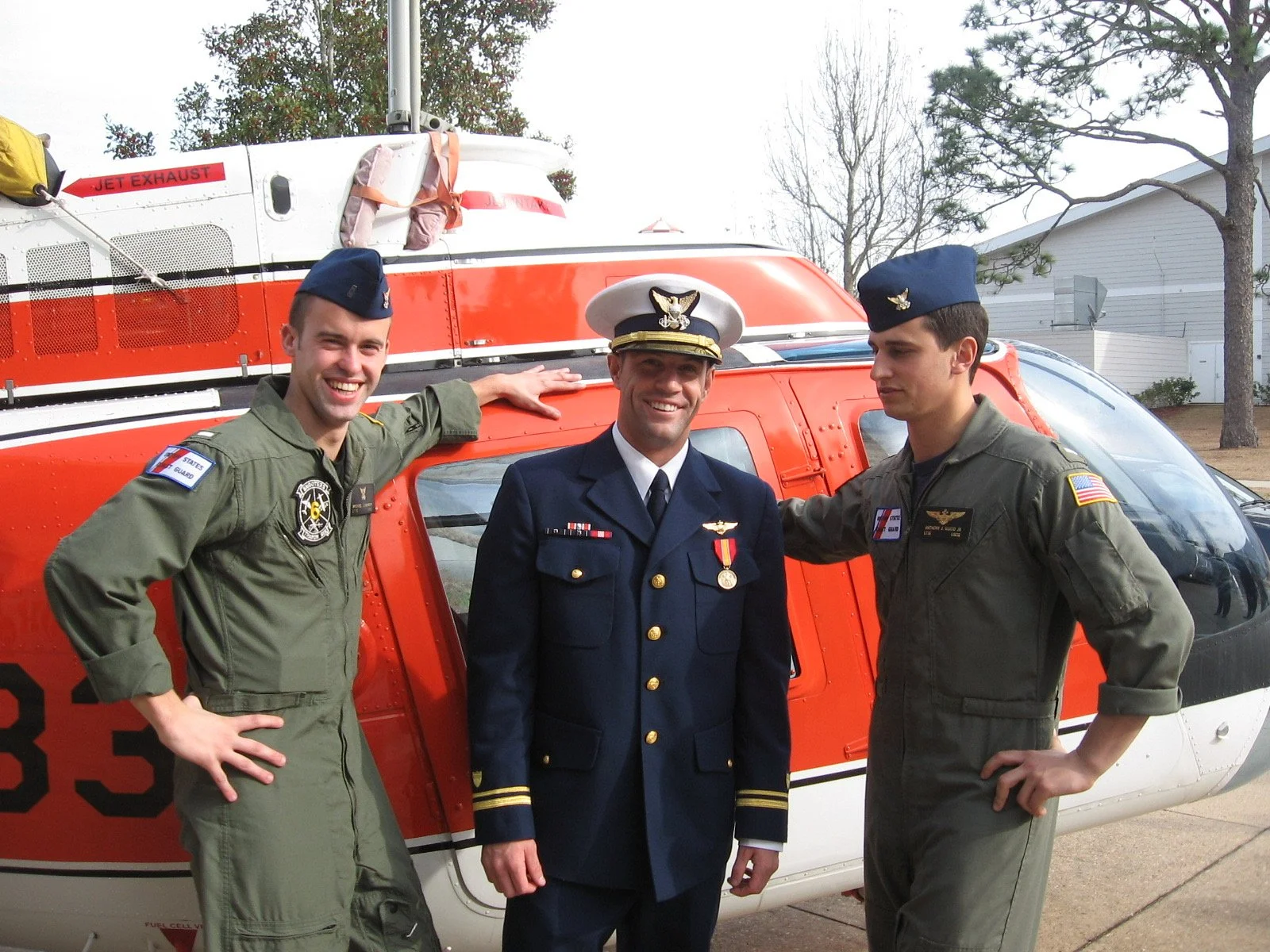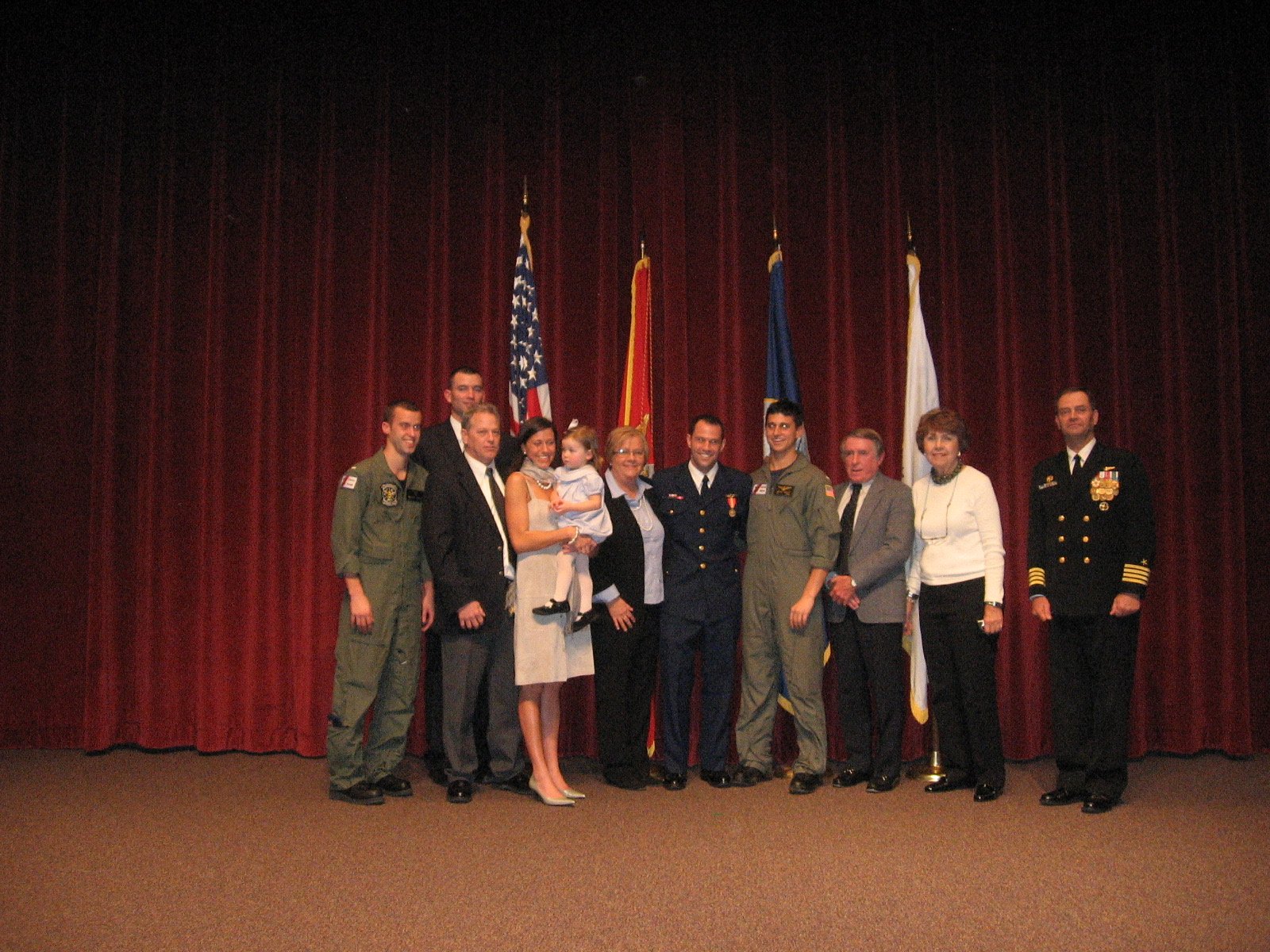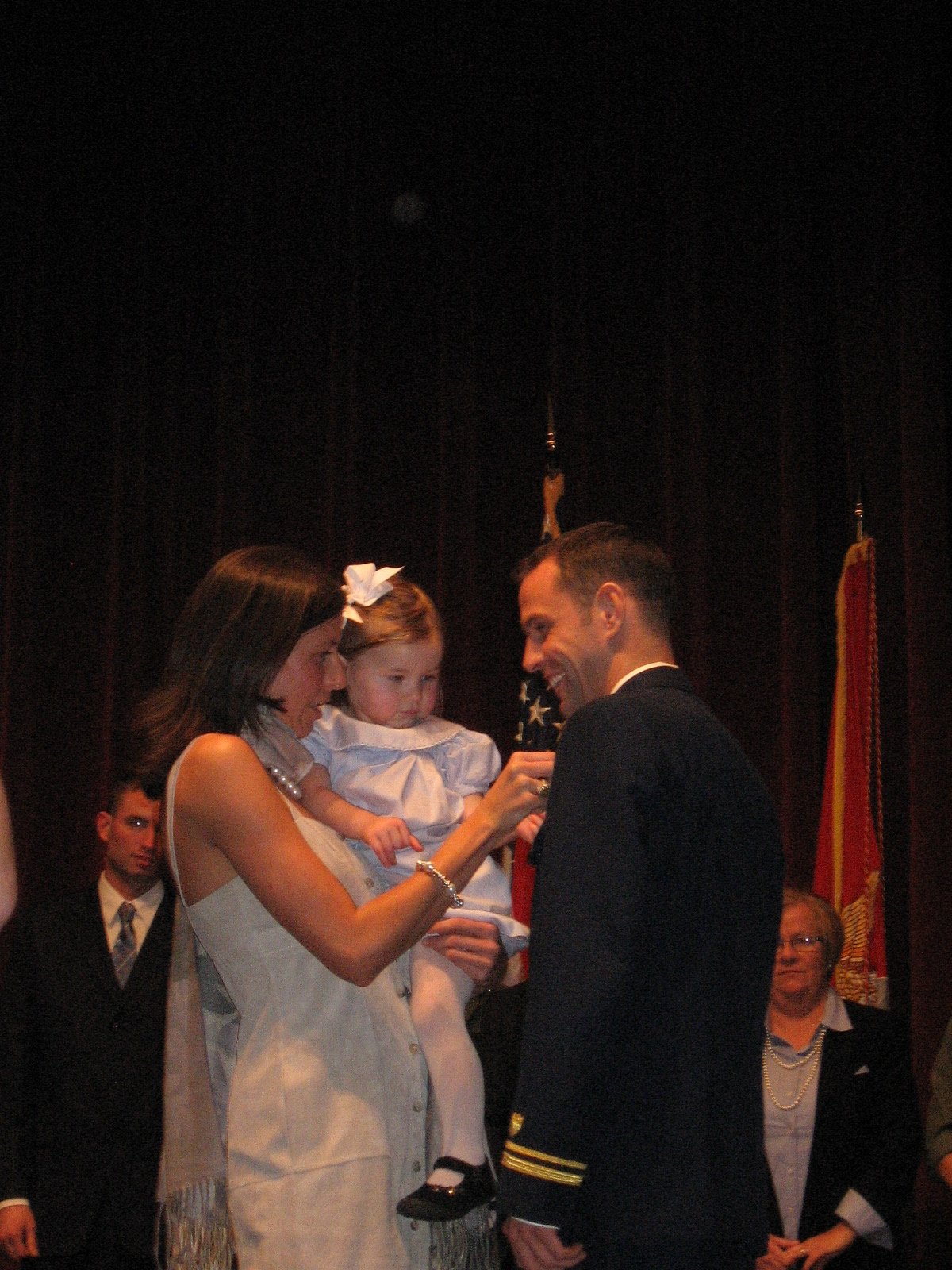“Wings of Gold”
I am proud of myself for completing my solo flight. I've gained some confidence and believe it's possible to make it through flight school and earn my "Wings of Gold", but there's a long way to go. The Flight school manuals have line drawings of the course flow. I'm pretty sure the Navy commissioned the same talented artist who made the course rules diagram.
The course flow is daunting and shows every event required to complete flight training. After my solo, I have completed 37 of the required events for primary flight training (plus a few bonus events after failing) and I have 74 events remaining. After primary flight training, I will start again with advanced helicopter training, adding another 94 events. Between primary and advanced, I still have about 170 opportunities to fail and never become a pilot.
Over the next four months of primary flight training, I battle constant pressure and fight to pass every flight. I spend hours locked in a simulator learning to fly in the clouds using only instruments. I practice aerobatics and fly loops, barrel rolls, and wingovers. I fly in formation, just a few feet from other students. None of it comes easy, but I continue to study with Matt, watch Rocky's speech every morning, and move forward one event at a time.
I feel like I am still a terrible pilot. I am behind my peers, barely passing every flight, until my last flight.
I am scheduled for my last two flights with a Navy Reservist. He was a prior Navy flight school instructor and now flies full-time for the airlines and part-time in Navy flight school. He exemplifies a professional pilot. He has countless hours. He has seen it all. He makes it very clear that he flies for the Navy for fun, and I am excited that I will get to fly with him. Our mission for today is a day navigation flight to get dinner somewhere and then a night navigation flight home.
"Plan to terminate with a precise ETA. Students will not use radio NAVAIDS or GPS. Students may only use a chart, visual references, speed, heading, and time."
Aware that I have had several problems navigating in the past, I have meticulously planned the route and spent hours studying the chart. The brief is smooth, the first flight is straightforward, and we land somewhere in Alabama to have dinner. As we fly home in the dark, I focus intently on not getting lost. I am reviewing every visual checkpoint because I know I just need to pass this flight to complete primary flight training.
As we pass a small civilian airport, he says,
"Your navigation is going great, and we have plenty of gas. I could use some pattern work. How do you feel about doing a couple of laps in the pattern?"
I hate it. I hate everything about this idea. All I want to do is land back home and know I will never have to climb into this awful airplane again.
"Sounds great Sir."
He flies the first patterns as I make the radio calls. I’m anxious because it will be my turn soon. He passes me the controls, and I take a few deep breaths. We do a landing with flaps on the first pattern, and I have no issues. I feel good but only think about how badly I want to finish this flight. On the following pattern, he asks me to fly on a no-flap landing.
"Gear down, landing checklist complete."
I line up on final and think of Major Galluzzo.
"aimpoint, airspeed, aimpoint, airspeed"
I can do this.
"Gear down and locked."
Power out. Flare. Look at the horizon. I float down the runway and touch down so gently that the ground is barely perceptible. I push the power back in and take off.
"George, I have been instructing a long time, and that was the best no-flap landing I have ever seen from a student. It was perfect. Let's end on that and go home."
It is the greatest moment of my life, and I try not to get choked up as I thank him for his feedback.
I did it.
[It's been 15 years, and I haven't landed an airplane since. I still want to end on that flight.]
Even though I am ecstatic about finishing primary, it's no time to celebrate because I still have a long journey ahead.
I figured out how to land a plane, but I still need to make it through advanced training and learn to fly a helicopter.
I have some time off before there is an opening for me in advanced training, and unfortunately, I am met with a new obstacle. Because of the stress of the last few months and treating my body like a dumpster, my sinus problems have worsened, and I am continually on antibiotics for sinusitis. The flight surgeon recommends sinus surgery and tells me that I need to fix my condition or I will be medically disqualified for flight. I am frustrated because I finally figured out how to avoid failing out, but I need to fight to stay medically qualified.
The surgery goes well, and they remove some problematic parts of my sinus. I recover quickly from the surgery, but some of the headaches and sinus irritation remain. I am worried, but my surgeon recommends cleaning up my diet and removing some inflammatory foods. I think he is crazy, but I will try anything to stay in flight training. I start eating healthy, remove all dairy products, and commit to taking care of my body. Surprisingly, my sinus problems disappear almost overnight, and in July 2009, I start advanced flight training.
I am sitting next to my onwing, and she is showing me how to hover the TH-57B. She barely manipulates the controls, and the helicopter is perfectly stable a few feet over the grass. She explains what she is doing, and it looks effortless. She spends some time moving the helicopter in each axis, and I am amazed at how maneuverable the helicopter is. I don't understand why she is spending so much time explaining everything. Keeping the aircraft in the same position can't be hard, and I am ready to start.
We are at Spencer Field, an enormous one-mile by one-mile square practice area used by training aircraft. My ownwing has us situated in a corner and establishes a box nearly half a mile long. She explains that the objective is to maintain a hover in that box. No problem.
As she hovers, she first gives me the rudder pedals and maintains the rest of the controls. I yaw the nose slightly left and right. She shows me how pulling more power with the collective causes the nose to yaw right — got it. We hover this way for a few minutes, and I do a great job maintaining heading. Next, she gives me the collective, and I use my left hand to climb and descend. Now I am maintaining my heading and altitude, and it’s no problem. After a few more minutes, she asks If I am ready for the cyclic and to have all flight controls. Can’t she see how great I am doing with the pedals and collective? Obviously I’m ready. I can’t believe she has given me a half-mile square area just to hover. She gives me the cyclic, and I am hovering a helicopter for the first time. It feels incredible, and I realize I am living my childhood dream. I am immediately snapped out of my nostalgia as all hell breaks loose. My stable hover somehow has turned into a 15 knot forward air taxi and the tree-line that was a quarter mile in front of me is rapidly approaching. I watch my onwing out of the corner of my eye and she is entirely unbothered. I wonder if she realizes how little control I have as we are careening toward the forest. I pull back hard on the cyclic to avoid weed-whacking the trees with our rotor blades and accidentally initiate a steep climb. I arrest the forward drift, but with the collective setting, I am climbing well above the assigned hover altitude. I lower the collective to correct my altitude, and the nose yaws right. I can only correct one problem at a time, and my hover feels like a bull ride. I am using every bit of the half-mile box, and I am unable to regain anything close to a stable hover at any point. My onwing calmly provides me some tips, “Look out at the horizon and make smaller corrections.” I try my best to do what she says, but nothing seems to help. Eventually, she takes the flight controls back and all motion stops as if the helicopter has had an exorcism. She tells me that I did fine and that nobody can ever keep the helicopter in the box on their first flight. Even though hovering seems impossible, I enjoy every minute of my first helicopter flight. My onwing is incredibly smart and demands perfection on briefs and procedural knowledge. She loves instructing and explains that her high standards will ensure my success through advanced training. She is right.
I wouldn't go so far as to say I breezed through advanced training, but helicopters make much more sense to me than planes. My study habits and work ethic are paying off, and I believe in myself again. A few months later, on January 5th, 2010, I completed my last training flight. The instructor and I celebrated with a beer, and it was the best beer I have ever tasted.
My winging ceremony was a few weeks later, and on January 15th, 2010, I earned my “Wings of Gold”. I stood on stage in my dress uniform with my family and best friends. My sister and young niece pinned my wings on my chest, and I swelled with pride. Few people knew what it took for me to get to that moment. I endured many failures, quit, lost hope, hit the bottom, and fought all the way back. Against all odds, I made it from a boy with an impossible dream to a pilot.
After the winging, we transitioned to a reception for the newly winged aviators. We all had unique steins with our aviator number, wings, and aircraft on them, and we toasted to our respective services. The Training Air Wing 5 Commodore, Col John "Vapor" Walsh, delivered a speech to conclude the winging reception.
"Vapor" was a Marine Corps Harrier pilot. Imagine the young marines on the recruiting posters and add 20 years of battle hardening and fighter jet flying.
"Vapor" is wearing an impeccable full-dress uniform. His entire chest is full of medals, and he has the highest high and tight I have ever seen. "Vapor" embodies everything that it means to be a military leader. He is a legendary war hero who flew in the Gulf War.
"Captain John S. Walsh, a VMA 542 pilot, had the closest of calls. While attacking an Iraqi armored column, his AV-8B was hit amidships by an infrared-guided SAM. At about 8,000 feet, the blast perforated the Harrier’s right wing and blew off the flap. It also set fire to the fuel in the right-wing tank, producing a trail of fire three times the length of his jet. Walsh was determined to get out of enemy territory, but the Harrier was coming apart around him. Realizing that the Ahmad al-Jaber Air Base in Kuwait had ostensibly fallen to Marines, he hoped to land there and save himself and his jet.
Once over al-Jaber, Walsh tried to lower the landing gear, but it would not come down. As he tried to decide the best place to eject from his jet, the controls froze up and the plane flipped on its back. Though flying at only 900 feet above ground, he ejected. The seat performed perfectly, getting him right-side up just before ground impact. The only human activity that Walsh saw from his location was a cloud of dust on the horizon that fortunately turned out to be a Marine patrol. He was rescued and found his way back to King Abdulaziz Air Base within a few days." -https://www.usmcu.edu/Outreach/Marine-Corps-University-Press/Expeditions-with-MCUP-digital-journal/The-Desert-War/
"Vapor" is captivating, and when he stands in front of all of us, the room immediately falls silent. He begins his speech, thanking everyone for their attendance and congratulating the pilots. Next, he addresses the parents. He explains how their sons and daughters in the Navy and Marine Corps will do incredible things while defending our great nation. As I listen, I am curious what a warrior like "Vapor" will say about the Coast Guard, and he starts,
"The Coast Guard parents should be extremely proud of their sons and daughters. In the not-so-distant future, someone will be out on the ocean and find themselves in an unfortunate situation. They might be out on a dark and stormy night when their boat sinks, and they find themselves in the water. They will be alone and fighting for survival. They will begin to hope for a miracle and pray to whatever they believe in. Your sons and daughters will answer those prayers and be that miracle. Just as that person in the water starts to lose hope, your sons and daughters will arrive in a helicopter and save their life."






